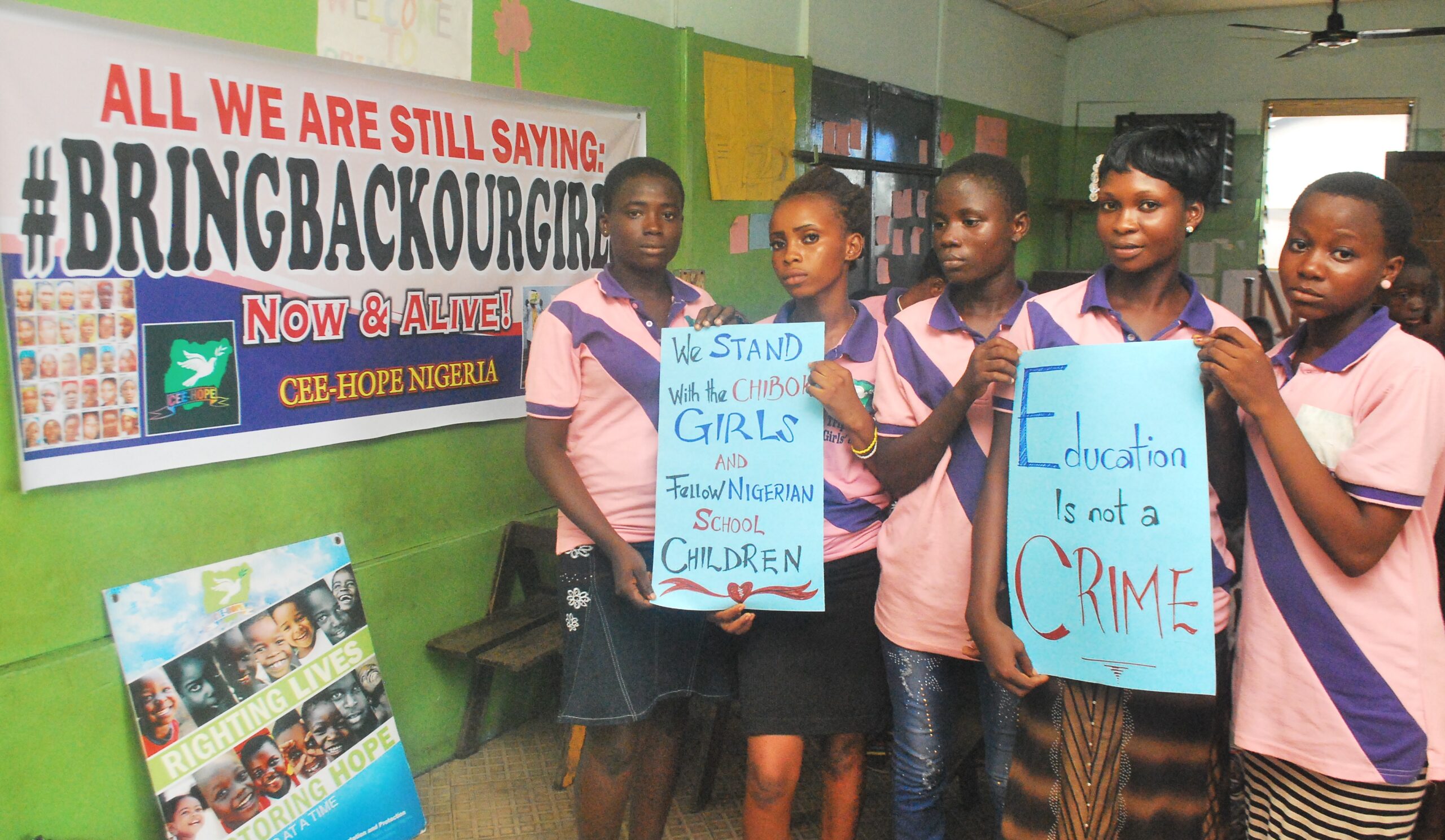
Photo Credit: Cynthia Rucker/Demotix/Corbis
On the 14th April 2014, 276 Christian female students were kidnapped by the Islamist terrorist group popularly known as Boko Haram at Chibok Secondary School in Chibok, a town in Borno state in Nigeria. These girls had been kidnapped from their dormitory on the night before their final exams, whilst dozing in their beds and on their studying notes. It so happens that these girls were just on the verge of graduating as some of the only educated young women in an impoverished region where most girls never have the chance to learn how to read (according to Plan International State of the World’s Girls Report, about 6 million girls were out of school in Nigeria at the time).
Following the kidnapping, the girls’ parents pursued the terrorists on motorbikes and on foot until the trail went cold. Shortly after , a group of Nigerian activists started a campaign on Twitter to call on the government to act promptly for the immediate release of the girls to their parents, and to restore their chance to complete their education, leading to the viral hashtag which spearheaded the campaign; #BringBackOurGirls
The lack of safety in communities such as the ones the Chibok girls live in lead to an increase of the number of girls dropping out of school, and the tragedy serves as an unfortunate case study on one of the roots of gender inequality in education in Nigeria – which currently stands at 57%, according to Plan International Nigeria. The ongoing situation has reached the extent that some parents have now stopped their children from going to school altogether, which denies these children of their basic right to education. However, considering the difficult scenario where some girls have to choose between going to school and staying alive, it is difficult to blame those parents. To solve the situation, the Nigerian government must boost security, especially in remote towns like Chibok, in support of girls’ education.
Unfortunately the lack of safety for girls is prevalent in other African countries – namely Ghana, Zanzibar among others. For instance, according to Action Aid, many teenage girls in the Upper West Region of Ghana are abducted and forced into child marriage while on their way to school, with an average of more than 50 girls being taken each year . This horrifying statistic is intensified during the rainy season, where these girls must walk through fields of long grass to get to school and as such are exposed to attackers. Incidents as the ones described in this article further widen the gender inequality gap. According to UNICEF, 132 million girls are out of school currently – a number which may increase if proper safety measures are not put in place by governments and authorities in the various countries. Even interventions as simple as Action Aid’s efforts of providing girls with bicycles in order to reach school safely can make a huge difference.
Sex for grades or transactional sex, which involves female students having sex with male lecturers to get good grades or pass their exams is another dimension to the lack of safety of girls in educational institutions. This is a common practice in Sub Saharan Africa and in the case of Liberian universities, it is reported that 85% of female students had been sexually harassed or involved in transactional sex while they studied. An Action Aid report in 2010 also details about 60 million girls and young women were sexually assaulted at, or on their way to and from, their place of study. This was also attributed to factors such as poor campus facilities such as lack of lighting at night despite late night classes being common in the region. The safety of girls is therefore not only threatened by the men that surround them, but also by lacking infrastructure that was not designed with them in mind.
The case of the Chibok girls only highlights one of the many dangers girls face in getting to school. It is safe to say that even if all these girls are returned safe and sound, there is still a lot of work to be done in fighting for the safety of young girls across different communities in Africa and in general. The #BringBackOurGirls campaign seems to have been forgotten but the never-ending trauma these girls and their parents might be going through lingers, and this is the reason why as activists, governments and individuals, it is very important to ensure that we use our voices and also hold our leaders accountable to their words, actions and inactions.
To the girls who in spite of all these dangers still forge ahead to go to school, we celebrate you and Rest in Peace to all the young queens who have lost their lives in the process. Your plight will and is inspiring change in communities and hopefully one day, the safety of girls will be secured and so will their educational quality globally.
References
Action Aid (2021). Girls’ Education. Available from:https://www.actionaid.org.uk/our-work/womens-rights/girls-education
Akwagyiram, A (2018). ‘Bring Back Our Girls’ campaign co-founder to run for president in
Nigerian elections’. Available from:
https://www.independent.co.uk/news/world/africa/chibok-girls-activist-run-president-nigeria-elections-ex-minister-obiageli-ezekwesili-a8572961.html Date Accessed: 13th March 2021
Ford, L. (4th March, 2013). Liberian women battle against ‘sex for grades’ at universities. Available from: https://www.theguardian.com/global-development/2013/mar/04/liberian-women-battle-sex-grades-universities Date Accessed: 28th March 2021
Hinshaw, D. and Parkinson J. (2021). “I want to do this”: How Michelle Obama joined a Global Campaign to Bring Back Our Girls’. Available from: https://www.vanityfair.com/news/2021/02/how-michelle-obama-joined-a-global-campaign-to-bring-back-our-girls Date Accessed: 13th March 2021
Paddison, L (October 4, 2017). Educating girls: the key to tackling global poverty. Available from: https://www.theguardian.com/opportunity-international-roundtables/2017/oct/04/global-poverty-child-marriage-education-girls
Date Accessed: 28th March 2021
Plan International. Bring Back Our Girls’ Rights In Nigeria. Available from:
https://plan-international.org/bring-back-our-girls-rights-nigeria Date Accessed: 13th March 2021
